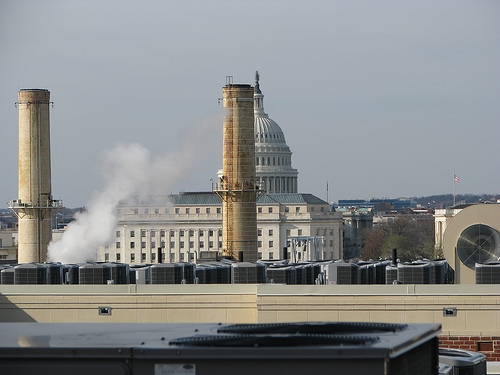Today marks the 4th anniversary of the Supreme Court’s landmark decision in Citizens United v. Federal Election Commission. But the decision–which opened the floodgates to unlimited corporate political spending–isn’t just of interest to political and legal scholars. If you care about science-based policy, you also have a dog in this fight.

Following Citizens United, we saw a drastic increase in political activity of dark money groups, which don’t have to disclose their funders. But the SEC can address this by enacting a rule on corporate political disclosure. Photo: Dan Macy
If you’ve been following climate action (and inaction), you’ll know the familiar actors known to spread misinformation about climate science and block progress on policy initiatives to address climate change. The Exxon Mobils and the Koch Brothers of the world are now household names. But in recent years, another set of players have come onto the field in a bigger way. Not corporations and billionaires but dark money groups, including trade and business associations and think tanks. Dark money groups are so called because their funding sources are unknown. Such groups have tax-exempt nonprofit status and thus, are not legally required to disclose their donors. This allows companies and individuals to fund climate-policy-blocking groups without the actions being affiliated with their name.
New Report Shows How Companies can use Trade Groups to Anonymously Influence Climate Policy
Our newly released report, Tricks of the Trade: How Companies Influence Climate Policy Through Business and Trade Associations, revealed that many companies choose not be transparent about their affiliations with trade and business associations, even when the information is publicly available. Groups included the U.S. Chamber of Commerce, the National Association of Manufacturers (NAM), the American Petroleum Institute, and the Edison Electric Institute (EEI). We also found that even when companies did choose to name their trade group board seats, many claimed to disagree with the trade group’s climate position. These findings add to the growing number of examples of how the anonymous funding of trade groups and “social welfare” groups inhibits policy efforts to address climate change, along with other issues that affect our health and welfare.
The Securities and Exchange Commission Can Enact a Solution

The (now former) SEC Chair Mary Shapiro speaks at the U.S. Chamber of Commerce. The large business association has been outspokenly opposed to the proposed SEC rule that would require publicly traded companies to disclose their donations for groups like the Chamber. Photo: Flickr/talkradionews
But there are solutions that could hold companies accountable for their support for trade associations and other dark money groups that block climate action. The Securities and Exchange Commission (SEC)—the federal agency responsible for protecting investors and overseeing publicly traded companies in the United States—can help address this lack of transparency through its rule-making process. In 2011, a group of 10 high-profile law professors filed a petition with the SEC arguing that the agency should issue a rule that would require publicly traded companies to disclose both their direct and indirect political activities. And that petition was not quietly filed away. Since then, the petition has gathered nearly 700,000 signatures—more than the agency has ever received on a rule—with most comments, about 99 percent, in favor.
NAM and the US Chamber of Commerce Fight Back
But behind the proposed SEC rule’s overwhelming public support, many trade and business associations mobilized in opposition. A letter submitted to the SEC by 29 trade groups urged the SEC not to consider the rule. The groups opposing the rule in the letter included the U.S. Chamber of Commerce and National Association of Manufacturers—two groups that our research shows block climate action and have many board members who either don’t disclose their board seat or claim they don’t agree with the group’s climate position.
Following this opposition by major trade and business associations, in December 2013 the SEC removed consideration of the rule from its rulemaking agenda for 2014, unfortunately signaling that the agency does not plan to make this issue a 2014 priority.
Tell the SEC to Take Action
But the agency can fix this. SEC Chair Mary Jo White should make corporate finance reform a priority and put consideration of the rule on enhancing corporate political disclosure back on the Commission’s rule-making agenda for 2014. More transparency in corporate political activities is needed. The public deserves to know who is influencing decisions on issues, such as climate change policy, that will affect its health and welfare. If you agree, join me and nearly 700,000 others in support of proposed SEC rule and add your name to the petition by following the below link.
Join me in asking the SEC to enact the rule on corporate political disclosure.
